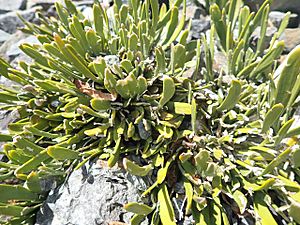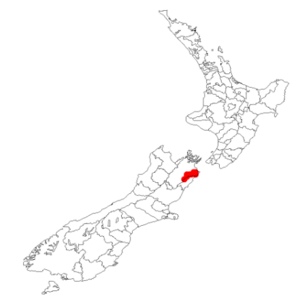Carmichaelia astonii facts for kids
Quick facts for kids Carmichaelia astonii |
|
|---|---|
 |
|
| Conservation status | |
 Nationally Vulnerable (NZ TCS) |
|
| Scientific classification | |
| Kingdom: | |
| (unranked): | |
| (unranked): | |
| (unranked): | |
| Order: | |
| Family: | |
| Genus: | |
| Species: |
C. astonii
|
| Binomial name | |
| Carmichaelia astonii G.Simpson
|
|
 |
|
| Occurrence data from AVH | |
Carmichaelia astonii, also known as Aston's dwarf broom, is a special type of pea plant. It belongs to the Fabaceae family, which includes many plants like beans and peas. This unique plant is only found in the South Island of New Zealand. Sadly, it is considered "Nationally vulnerable," meaning it needs protection to survive.
Contents
About Aston's Dwarf Broom
Aston's dwarf broom is a small shrub that grows in certain parts of New Zealand. It is part of a group of plants called legumes. These plants are known for their pods, which contain seeds like peas or beans.
Where it Lives
This plant is native only to the South Island of New Zealand. It grows in specific areas, often near rivers or in rocky places. Its limited habitat makes it more vulnerable to changes in its environment.
Conservation Status
As of 2018, Carmichaelia astonii is listed as "Nationally vulnerable" by the New Zealand Threat Classification System. This means there are not many of these plants left. Scientists and conservationists are working to protect it. They want to make sure it does not disappear forever.
Naming the Plant
The scientific name for this plant is Carmichaelia astonii. It has an interesting story behind its name.
Who Discovered It
The plant was first officially described by a botanist named George Simpson. He wrote about it in 1945. Botanists are scientists who study plants.
Honoring Bernard Aston
George Simpson named the plant astonii to honor Bernard Aston. Bernard Aston was another important person in New Zealand's plant world. He contributed a lot to the study of New Zealand's native plants. Simpson wanted to remember Aston's work by naming this unique plant after him.
Where it was Found
George Simpson collected a sample of this plant in February 1937. He found it near the Ure River in the Marlborough Region of New Zealand. This sample is now kept in the Auckland Museum. It helps scientists study the plant.
 | Selma Burke |
 | Pauline Powell Burns |
 | Frederick J. Brown |
 | Robert Blackburn |

